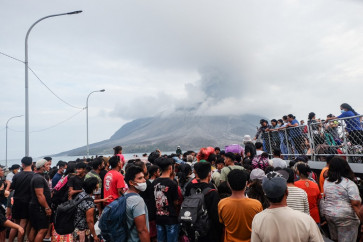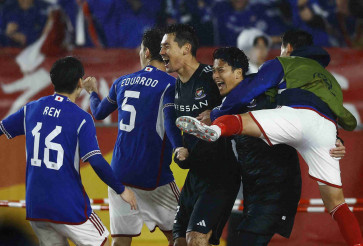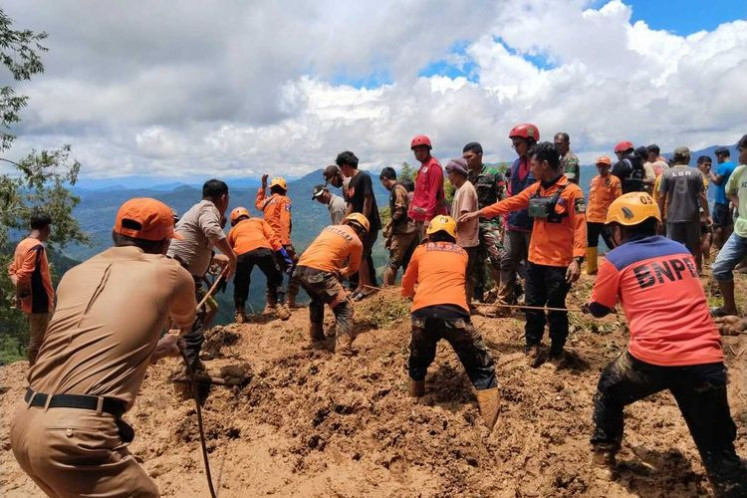Jokowi-Kalla hawkish on economic policies
A document on the vision, mission and working programs of presidential hopeful Joko âJokowiâ Widodo and his running mate, Jusuf Kalla, has revealed an aggressive approach to reforming the economy, education and security
Change Size

A
document on the vision, mission and working programs of presidential hopeful Joko 'Jokowi' Widodo and his running mate, Jusuf Kalla, has revealed an aggressive approach to reforming the economy, education and security.
The 41-page document, a copy of which was obtained by The Jakarta Post on Tuesday, was fielded by Jokowi to the General Elections Commission (KPU) on Monday as a registration requirement for presidential candidates.
In the oil and gas sector, for example, Jokowi-Kalla plans to issue a government regulation in lieu of law (Perppu) to replace the existing Oil and Gas Law, which has created a myriad of uncertainties after the Constitutional Court dissolved the Upstream Oil and Gas Executive Agency (BPMigas).
'The dissolution of BPMigas and the formation of its replacement, SKKMigas [Upstream Oil and Gas Regulatory Special Task Force], have caused uncertainty, which led to a reduction in investment and exploration,' said the document.
'Improvements in the sector's management will be taken through the issuance of a Perppu, as a short-term measure, and the revision of the Oil and Gas Law, which is aimed at developing national capacity and to provide permanent legal certainty.'
The pair also proposed more flexible fiscal incentives for the oil and gas sector, which would be based on exploration difficulty and development areas.
An overhaul in the administration of licensing for new investment in the sector is also proposed.
Oil production in Indonesia has steadily declined to around 800,000 barrels per day (bpd), down from 1.03 million bpd in 2004, according to figures from SKKMigas.
New oil discoveries have proved elusive due, in part, to bureaucracy and the challenges brought about by legal uncertainty.
The Jokowi-Kalla programs make up the so-called Nawacita ' a Sanksrit term for nine programs ' authored jointly by Jokowi, Kalla, chair of the Indonesian Democratic Party of Struggle (PDI-P), Megawati Soekarnoputri, and a team of academics and professionals, according to PDI-P executive Puan Maharani.
'Nawacita is nine programs that will be run by the candidates if they win the presidency,' said Puan.
'But we still have time to make them more comprehensive. The programs did not just appear 'out of the blue'. They had been arranged, along with Pak JK [Jusuf Kalla], in the past,' she said.
In the mining sector, the pair proposed to maintain the current policy that focuses on downstream processing and uphold the ban on raw mineral exports.
A proposed change in the sector was the strengthening of the authority of the coordinating economic minister when managing the resources.
In infrastructure development, the pair will target the construction of 2,000 kilometers of roads nationwide, 10 new airports, 10 ports and 10 industrial estates.
An aggressive approach will also be taken when developing the agricultural sector by improving the irrigation network, which will cover 3 million hectares of rice fields, with 1 million hectares being outside Java.
'The programs are aimed at ensuring that we move forward. We should have a clear program to sell to the people,' said Kalla.
Other aggressive programs are evident in the proposals to reform education.
Jokowi-Kalla proposed to raise the quality of education and training through its 'Indonesia Pintar' (Smart Indonesia) program with a free 12-year compulsory education.
The pair plan to reorganize the education system by prioritizing the inclusion of civic education, history, character building and patriotism.
For elementary education, around 70 percent of teaching hours should focus on attitude and character building, while for higher education around 40 percent should be spent on science-related subjects and 60 percent on applied knowledge.
For university, subsidies will be provided to state universities along with grants for research and technology development.
Another major program promised by the pair is police reform.
Among the key points is the empowering of the National Police Commission (Kompolnas) as a watchdog institution. The agency, which is supposed to function as an independent supervisor, has been restricted by the Police Law and merely serves an advisory role.
The program also includes revisions to several regulations to help root out graft in the police force.
Integrity and transparency have increasingly become rare ideals within the police force, more than a decade after policymakers decided to expand their law enforcement mandate ' decision aimed at ending 35 years of military domination of security affairs.
Aside from improving discipline in the police force, Jokowi will also overhaul police education and training, in the hope of producing officers with a civilian mind-set.
In terms of antigraft measures, Jokowi wants to focus on cleaning up the judicial system, the Finance Ministry's Directorate General of Taxation and the Directorate General of Customs and Excise.
Graft among politicians and businessmen in the natural resources sector will also be prioritized,
according to the document.
Excerpts from Jokowi-Kalla programs
(submitted to the General Elections Commission on Monday)
Three key existing problems:
1. Threat to the authority of the state.
The nation has lost the ability to enforce its authority as it has failed to ensure the safety of its citizens, detect future threats to its sovereignty, protect human rights and uphold strong law enforcement.
2. Weaknesses in the pillars of the economy.
The weaknesses in the pillars are evidenced by the continued high rate of poverty, welfare inequality, development gap between regions, environmental destruction as a result of natural-resource overexploitation, and too high a reliance on food, energy, finance and technology.
3. Intolerance and crisis in the nation's character.
The politics of uniformity has exhausted Indonesia's character as a nation of high-spirited fighters. It has also reduced the spirit of solidarity and mutual cooperation.
Nine agenda priorities:
1. Returning the state to its task of protecting all citizens and providing a safe environment.
'¢ Protect migrant workers
'¢ Protect maritime interests, particularly concerning borders and natural resources
'¢ Reduce the impact of globalization, regional economic integration and free trade
'¢ Increase the military budget to 1.5 percent of gross domestic product (GDP) within five years
2. Developing clean, effective, trusted and democratic governance.
'¢ Require all government institutions to produce performance reports
'¢ Open access to public information
'¢ Reform the bureaucracy
'¢ Improve public services
'¢ Issue a law on public service contracts
3. Developing Indonesia's rural areas.
'¢ Push regional administrations to cut their overhead costs and allocate more for public services
'¢ Improve public services in villages, subdistricts and districts
4. Reforming law enforcement agencies.
'¢ Prioritize reform of the judiciary
'¢ Resolve historic human rights violations
5. Improve quality of life.
'¢ Increase educational and training quality through the 'Indonesia Pintar' (Smart Indonesia) program with 12 years of compulsory and free education
'¢ Push the implementation of land reforms
'¢ Provide ownership program for 9 hectares of land
'¢ Develop more villages of row houses
6. Increasing productivity and competitiveness.
'¢ Construct 2,000 kilometers of roads
'¢ Develop 10 new airports and 10 seaports
'¢ Construct 10 industrial estates along with housing for workers
'¢ Build 5,000 traditional markets
'¢ Provide one-stop services for the processing of investments and business licenses with completion target of 15 days
'¢ Set up development and infrastructure bank
'¢ Build regional science and techno parks, academies and vocational schools
7. Promoting economic independence by developing domestic strategic sectors.
'¢ Expand the irrigation network to cover 3 million hectares of rice fields
'¢ Open 1 million hectares of rice paddies outside Java
'¢ Build a bank for farmers and small businesses
'¢ End the conversion of agricultural land
'¢ Cut energy imports by promoting exploration at home
'¢ Construct more gas pipelines
'¢ Prioritize the use of coal and gas to fuel electricity
'¢ Achieve a financial inclusion ratio target of 50 percent
'¢ Target a tax ratio of 16 percent
'¢ Restrict the sale of national banks to foreign investors
'¢ Increase research in agriculture and industry
8. Overhauling the character of the nation.
'¢ Reorganize the educational system by prioritizing the inclusion of civic education, history, character-building and patriotism
'¢ Evaluate national exams
'¢ For elementary education, 70 percent of the teaching must focus on building attitude and character
'¢ For higher education, 40 percent of teaching must focus on science, and 60 percent on applied knowledge
'¢ Provide subsidies to state universities
'¢ Provide financing for research and technology development
9. Strengthening the spirit of 'unity in diversity' and social reform.
'¢ Promote tolerance
'¢ Enforce the law to improve people's spirits
Specific issues:
Foreign affairs
Four pillars of priorities:
1. Committing to prioritize Indonesia's identity as an archipelagic state.
'¢ Engage in maritime diplomacy to accelerate the settlement of border issues with 10 neighboring countries
'¢ Ensure Indonesia's territorial integrity
'¢ Secure natural resources and special economic zones
'¢ Intensify defense diplomacy
'¢ Ease maritime rivalries between major nations and promote territorial dispute settlements
2. Increasing global role through middle-power diplomacy.
'¢ Develop the capacity to ensure the safety of Indonesians overseas
'¢ Prioritize the protection of Indonesian migrant workers
'¢ Promote multilateral cooperation in the United Nations, the World Bank, the International Monetary Fund (IMF) and the Organization of Islamic Cooperation (OIC)
'¢ Promote a balance and relevant cooperation at the G-20
'¢ Engage actively in conflict resolution and peace-keeping
3. Expand engagement in the Indo-Pacific region, which covers countries along the Indian Ocean and the Pacific Ocean.
'¢ Consolidate leadership in ASEAN
'¢ Strengthen ASEAN cooperation
'¢ Strengthen regional architecture, particularly of the East Asia Summit
'¢ Push for regional maritime cooperation, particularly through the Indian Ocean Rim Association
4. Formulate and implement foreign policies based on public participation.
'¢ Reorganize the Foreign Ministry
'¢ Promote specialization among diplomats in the fields of asset recovery, law of the sea and strategic research
Defense
'¢ Allocate 1.5 percent of GDP for defense budget within five years
'¢ Reduce imports by developing domestic defense industry
'¢ Develop the Navy into a respected regional force
'¢ Set up a National Security Council
Security
'¢ Improve discipline within the police force
'¢ Adjust police education and training to produce officers with civilian mind-set
'¢ Revise regulations governing the police force
'¢ Separate the police authorities to make and implement policies
'¢ Empower the National Police Commission (Kompolnas) to be a watchdog over the police force
Politics
'¢ Promote the use of the state budget to finance political parties
'¢ Develop a new 'national single identity number' system
'¢ Aim to pass 20 laws annually
'¢ Prioritize anticorruption measures in the judiciary, politics, tax offices, customs offices and natural resource industries
Energy
'¢ Issue a government regulation in lieu of law (Perppu) to replace the Upstream Oil and Gas Regulatory Special Task Force (SKKMigas) with a new energy management system
'¢ Revise Oil and Gas Law to prioritize the development of national capacity and provide legal certainty for businesses









